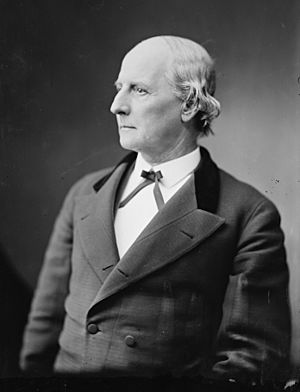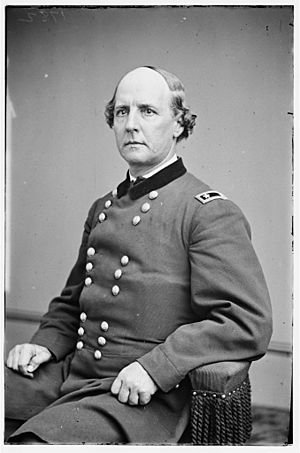Stephen A. Hurlbut facts for kids
Quick facts for kids
Stephen Augustus Hurlbut
|
|
|---|---|
 |
|
| Member of the U.S. House of Representatives from Illinois's 4th district |
|
| In office March 4, 1873 – March 3, 1877 |
|
| Preceded by | John B. Hawley |
| Succeeded by | William Lathrop |
| Personal details | |
| Born | November 29, 1815 Charleston, South Carolina |
| Died | March 27, 1882 (aged 66) Lima, Peru |
| Political party | Republican |
| Military service | |
| Allegiance | Union |
| Branch/service | Union Army |
| Years of service | 1835-42, 1861–1865 |
| Rank | |
| Commands | XVI Corps Department of the Gulf |
| Battles/wars | Seminole Wars, American Civil War |
Stephen Augustus Hurlbut (born November 29, 1815 – died March 27, 1882) was an important figure in American history. He was a politician, a diplomat, and a military leader during the American Civil War. Hurlbut served in the Union Army and later represented Illinois in the U.S. Congress. He also worked as an ambassador for the United States in other countries.
Contents
Early Life and Career
Stephen Hurlbut was born in Charleston, South Carolina. His father was a Unitarian minister and a teacher. Stephen studied law and became a lawyer in 1837.
He also served in the military during the Second Seminole War. This was a conflict between the United States and the Seminole people in Florida.
In 1845, Hurlbut moved to Illinois and started his own law practice in Belvidere. He married Sophronia R. Stevens in 1847, and they had two children together.
Political Beginnings in Illinois
Hurlbut became involved in politics in Illinois. In 1847, he was a delegate at the Illinois constitutional convention. This meeting helped create the state's new laws.
He supported the Whig Party and met Abraham Lincoln while campaigning for the 1848 Presidential Election. Hurlbut was elected to the Illinois House of Representatives in 1859 and again in 1861.
He actively supported Lincoln during the 1860 presidential election. Hurlbut even attended Lincoln's first inauguration as president in 1861.
Civil War Service
When the American Civil War began, Stephen Hurlbut joined the Union Army. He quickly rose through the ranks. He became a brigadier general in 1861 and a major general in 1862.
He commanded the 4th Division of the Army of the Tennessee during the important Battle of Shiloh. He also led his troops in the advance towards Corinth and during the siege of that city.
Hurlbut later commanded the XVI Corps from his base in Memphis, Tennessee. He also led a group of soldiers under General William T. Sherman in the 1864 Meridian expedition.
Towards the end of the war, Hurlbut was put in charge of the Department of the Gulf. He held this important position until he left the army in June 1865.
After the War
After leaving the army, Stephen Hurlbut helped create the Grand Army of the Republic. This was a group for Union Civil War veterans. He served as its commander-in-chief from 1866 to 1868.
Diplomatic and Congressional Roles
In 1869, Hurlbut was appointed as the U.S. Minister to Colombia. This meant he was America's top diplomat in that country for three years.
In 1872, he was elected to the U.S. House of Representatives as a Republican from Illinois. He served two terms in Congress.
His last role was as the U.S. ambassador to Peru in 1881. He worked there until his death in Lima in 1882. Stephen Hurlbut and his wife are buried in Belvidere Cemetery in Belvidere, Illinois.
Images for kids
 | Charles R. Drew |
 | Benjamin Banneker |
 | Jane C. Wright |
 | Roger Arliner Young |



